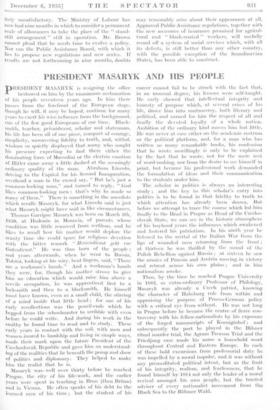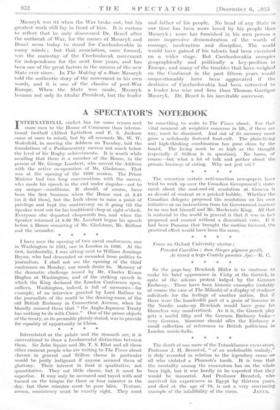PRESIDENT MASARYK AND HIS PEOPLE
PRESIDENT MASARYK is resigning the office • bestowed on him by the unanimous acclamation of his people seventeen years ago. In him there passes from • the forefront a. the European stage, though he will, it may be hoped, continue for many years to exert his wise-influence from the background, one of the few good Europeans of our time. Black- smith, teacher, privatdozent, scholar and statesman, his life has been all of one piece, compact of courage, Simplicity, unwavering fidelity to truth, and, withal, wisdom so quietly displayed that many who sought his 'presence expecting to find there either the dominating force of Mussolini or the electric emotion of Hitler came away a little dashed at the seemingly ordinary quality of the man. Abraham Lincoln, driving to the Capitol for his Second Inauguration, Overhead a man in the crowd say, " But he's just a common-looking man," and turned to reply, • ".God likes common-looking men : that's why he made so many of them." There is something in the anecdote Which recalls Masaryk, for what Lincoln said is just what Masaryk might have said in like circumstances.
Thomas Garriguc Masaryk was born on March 5th, 1850, at Hodonin in Moravia, of parents whose condition was little removed from serfdom, and lie likes to recall how his mother would deplore the scanty time she could spare for religious devotion With the bitter remark ". Herrendienst geht vor Gottesdienst." lie was thus born of the people ; and years afterwards, when he went to Russia, Tolstoi, looking at his wiry, bent fingers, said, `.` Those lire a worknian's hands." And a workman's hands they were, for, though • his mother strove. to give him an • education which would; raise.. him above a Servile occupation, he was apprenticed, first to a locksmith and then to a blacksmith. Ile himself must have .known, even as a small child, the stirring Of a mind inside that little head ; for one of his early recollections was the pencil-ends which he begged from the schoolmaster to scribble with even before he could write. And during his . work in the Smithy he found time to read and to study. These early years in contact with the soil, with men and Women inured to hardship and living in simple ways, made ;their mark. upon the future President of the Czechoslovak Republic and gave him an understand- ing of the realities that lie beneath the,pomp and show of politics and diplomacy. They helped to make him the .realist that he is.
Masaryk was, well over thirty before he. reached Prague, the ; city of his life-work, and the earlier Years were spent in. teaching in Brno (then Briinn) and in Vienna. He often speaks of his debt to the learned men of his time.; but the student. of his career cannot fail to be struck with the fact that, in an unusual degree, his lessons were self-taught. He early showed that intellectual integrity and honesty of purpose which, at several crises of his life, drove him into controversy, both literary and political, and earned for him the respect. of all and finally the devoted loyalty of a whole nation. Ambition of the ordinary kind moves him but little. He was never at ease either on the academic rostrum or the political platform, and, for a man who has written so many remarkable books, his confession that he wrote unwillingly is only to be explained by the fact that he wrote, not for the mere zest of word-making, nor from the desire to sec himself in print, but because his professional work demanded the formulation of ideas and their communication to the students under him.
. The scholar, in politics is always an interesting study ; and • the key to this scholar's entry into politics is to be found in that fidelity to .truth to which attention has already been drawn. But before we attempt to trace the course which led him finally to the Hrad in Prague as Head of the Czecho- slovak. State, we can see in the historic atmosphere of his boyhood years the influences which awakened and fostered his patriotism.. In his ninth year he listened to the recital of the Italian War from the lips of wounded men returning from the front ; at thirteen he was thrilled by the sound of the Polish Rebellion against Russia ; at sixteen he saw the armies of Prussia and Austria moving in victory and retreat across his own plains ; and in him nationalism awoke.
• Thus, by the time he reached Prague University in 1882, as extra-ordinary Professor of Philology, Masaryk was already a Czech patriot, knowing the character of Habsburg rule from within . and appraising the purpose of Prusso-German policy with a critical .eye from without. He was not long in Prague before he became the centre of fierce con, troversy with his fellow-nationalists by .his exposure of the forged manuscripts of Koeniginhof ; • and subsequently the- part he played in the Hilsner ritual murder trial, the Agram Treason Trial, and the Friedjung case made his name a household word throughout. Central and Eastern Europe. In each of these bold excursions from professorial duty he was impelled by a moral impulse, and it was without any premeditated political intent, but as the fruit of his integrity, realism, and fearlessness, that he found himself by,1014 not only the leader of a moral revival, amongst his, own people, but the trusted adviser of every nationalist .movement . from the
Black Sea to the Biihmer Wald. .
Masaryk was 64 when the War broke out, but his greatest work still lay in front of him. It is curious to reflect that he only discovered Dr. Bene§ after the outbreak of War, for the names of Masaryk and Bend seem today to stand for Czechoslovakia in many minds ; but that association, once formed, was the mainstay of the Czechoslovak movement for independence for the next four years, and has been one of the great factors in the success of the new State ever since. In The Making of a State Masaryk told the authentic story of the movement in his own words, and it is one of the classics of post-War Europe. When the State was made, Masaryk became not only Sits titular President, but the leader and father of his people. No bead of any State in our time has been more loved by his people than Masaryk ; none has furnished in his own person a more impressive demonstration of the worth of Courage,' moderation and discipline. The world would . have gained if his talents had been exercised on .a wider stage. But Czechoslovakia occupies geographically and politically a key-position in Europe, and Many of the troubles that haVe weighed on the Continent in the past fifteen years would ',unquestionably • have been aggravated if the destinies of Czechoslovakia had been entrusted to a leader less wise and firm than Thomas Garrigue Masaryk.. Dr. Bene§ is . his inevitable successor.













































 Previous page
Previous page